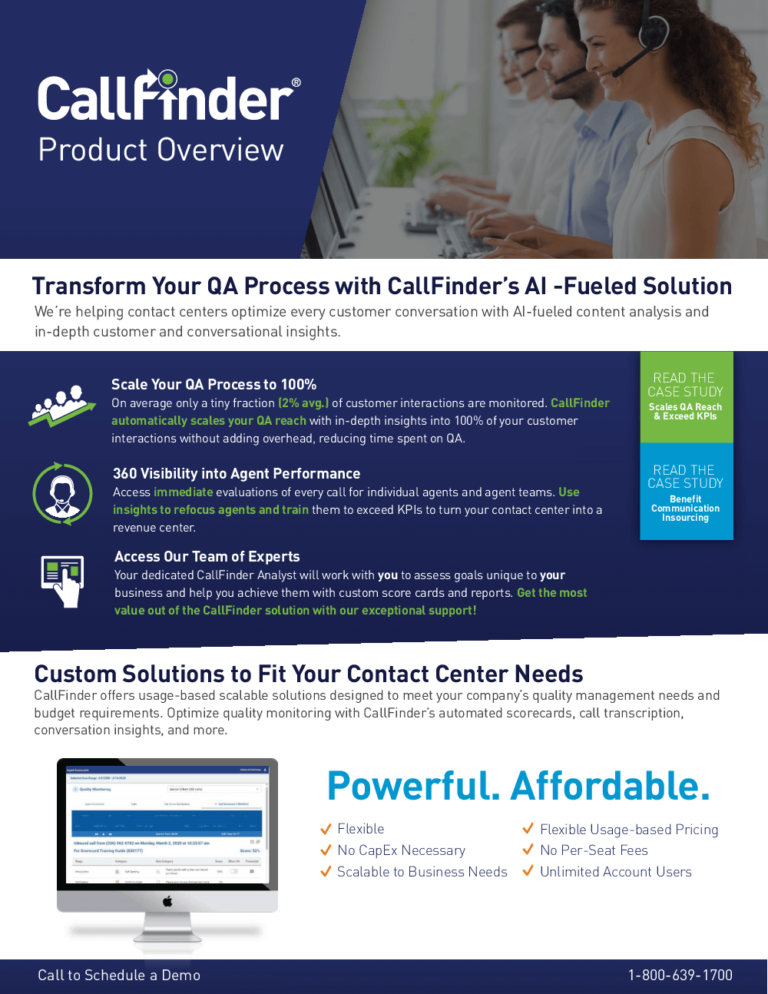Keeping top talent is one of the biggest challenges for businesses today, especially in the call center. Agent turnover is one of the most exorbitant costs for businesses with a contact center. The monetary losses can be staggering, including direct expenses for hiring and onboarding new team members, as well as the hidden costs of lost productivity, disrupted workflows, and institutional knowledge walking out the door. Studies have shown that the average cost to replace a salaried employee is 6 to 9 months’ salary, making turnover a massive drain on a company’s bottom line.
However, new conversation intelligence technologies are proving to be an effective antidote to this persistent problem. By collecting and analyzing the countless call recordings, these powerful solutions uncover deep insights that improve the overall employee experience and drive down costly turnover rates.
Here are seven key ways that conversation intelligence is boosting the employee experience and reducing churn in forward-thinking organizations:
1. Identifying Retention Risks Before It’s Too Late
Conversation intelligence platforms monitor every interaction between agents and customers. By analyzing the sentiment, topics, and overall tone of these conversations, the technology can identify employees who may be at risk of leaving the organization in the near future.
For example, if an agent is frequently expressing frustration, voicing concerns about their workload, or talking poorly about the company, managers have easy access to those warning signs. This allows managers and call center leaders to proactively address those issues before the agent decides to quit. Catching these red flags early is crucial, as research shows that most employees who resign are already mentally checked out long before they officially hand in their notice.
2. Providing Targeted Coaching and Support for Managers
Having the ability to analyze thousands of agent interactions gives managers critical insights to become better, more empathetic leaders. Conversation intelligence software highlights areas where managers excel at motivating and supporting their teams, as well as opportunities for improvement.
Armed with these data-driven insights, call centers can deliver highly personalized coaching and training for managers to strengthen their interpersonal skills, have more constructive feedback sessions, and create an environment where the agents feel truly valued and engaged. This type of targeted development is far more effective than generic management training, leading to measurable improvements in employee satisfaction and retention.
3. Improving the Critical Onboarding Process
The first few months at a new job are a pivotal time that can make or break an employee’s long-term tenure with the organization. The automated tools within a conversation intelligence system allows managers to closely monitor the onboarding process and quickly identify any pain points or friction points.
By reviewing the tone and sentiment of new hires’ interactions with customers, management teams can work with HR to course-correct the onboarding experience in real-time. This could include enhancing training programs, reassigning buddies or mentors, or adjusting workload expectations to create a smoother transition for new agents joining the team. With the ability to continually optimize the onboarding experience, call centers can set their new hires up for long-term success from the very beginning.
4. Uncovering Unfiltered Employee Needs and Concerns
Perhaps most importantly, conversation intelligence gives organizations an unfiltered window into the real experiences of their workforce. Rather than relying on occasional surveys or exit interviews, managers can continuously listen to what agents are really thinking and feeling through their daily interactions.
This wealth of genuine, unstructured insights allows HR teams and company leaders to be more proactive in addressing issues, making policy changes, and continuously improving the overall employee and agent experience. It’s a powerful way to build a culture of trust, empathy, and loyalty – crucial ingredients for retaining top talent.
5. Personalizing the Employee Experience
Going beyond just identifying risks and problems, conversation intelligence can also be leveraged to create highly personalized experiences that cater to each agent’s unique needs and preferences. By analyzing communication patterns, the technology can offer tailored recommendations for things like learning and development activities, team-building exercises, or even just the optimal way for a manager to provide feedback.
This level of personalization makes employees feel truly seen and valued as individuals, rather than just a cog in the machine, especially in a contact center environment. It demonstrates that the organization cares about their growth and fulfillment, which is a major driver of long-term engagement and loyalty.
6. Facilitating More Transparent and Constructive Feedback
Traditionally, feedback between employees and managers has been an awkward, one-way street – with managers delivering judgments and criticisms that employees often feel powerless to respond to. But conversation intelligence flips this dynamic on its head.
Tools that provide unbiased feedback, like automated agent scorecards, encourage a dialogue between managers and agents. In addition, the technology provides a detailed record that both parties can refer back to. This promotes more transparency, accountability, and two-way dialogue around feedback and performance reviews. Agents feel heard and empowered to have constructive conversations, rather than just passively accepting feedback.
7. Strengthening Connections and Relationships
At the heart of a positive employee experience is a strong sense of belonging and camaraderie. Conversation intelligence can help foster these interpersonal connections in a few key ways:
- Identifying opportunities for team building and bonding activities based on shared interests and communication styles
- Detecting signs of isolation or lack of social integration, allowing managers to step in and strengthen relationships
- Highlighting strong mentorship relationships that can be replicated across the organization
When people feel truly connected to their teammates and managers, they’re much more likely to be engaged, productive, and willing to go the extra mile.
In today’s highly competitive labor market, being able to attract and retain top talent is critical for an organization’s long-term success. Conversation intelligence is proving to be an invaluable tool in the battle against employee turnover, helping companies create an environment where people feel engaged, productive, and eager to stay for the long haul.
By tapping into the wealth of insights hidden in customer conversations, forward-thinking organizations can continuously improve the employee experience and reduce the staggering costs associated with high churn. It’s a win-win scenario that’s transforming how companies and call centers think about talent management in the 21st century.








